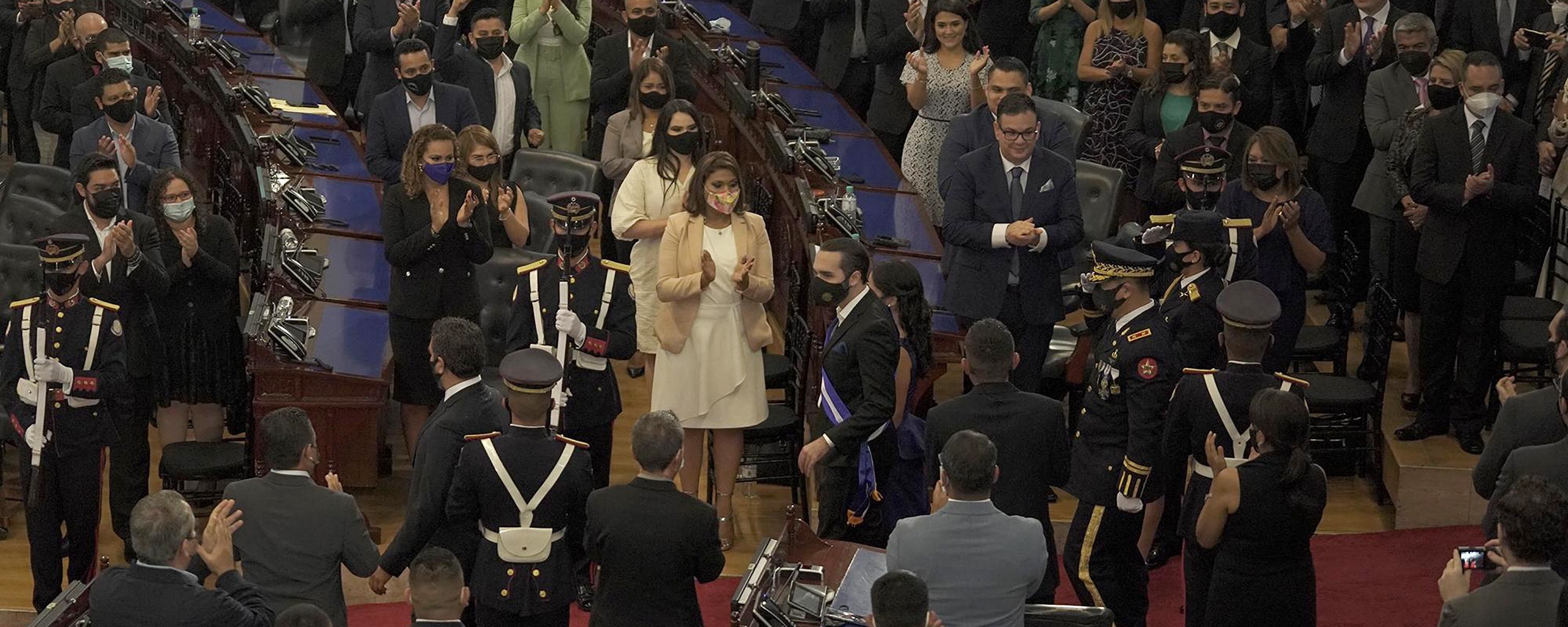The Salvadoran legislature passed Penal Code reforms Tuesday night to criminalize media or journalists who “reproduce and transmit messages from or presumably from gangs that could generate uneasiness or panic in the population.” This new crime is punishable with up to 10 to 15 years in prison.
The reform, proposed by President Bukele on Tuesday afternoon and approved by the Assembly in just over three hours, penalizes the “elaboration or facilitation” of texts, graphics, or graffiti that transmit messages 'that allude to the maras or gangs” and, alarmingly, imposes “equal sanctions” for any who share these messages “through communications technology, radio, television, written or digital means.”
The Salvadoran Journalists' Association (APES) called the measures a form of censorship. 'We’re concerned about the arbitrary application of these reforms,” said APES president César Fagoaga, given the statements of ruling-party legislators asserting that 'the press has been a mouthpiece for the gangs.' He added: 'The gangs will not disappear if we simply do not mention them.”
APES warns that 'these gag order reforms are a new tool to criminalize journalistic work,' following a trend in El Salvador. On Feb. 1, the Legislative Assembly approved an 'undercover digital agents law' that press advocates say created a legal framework for previously illegal espionage. In January, international experts exposed the use of Pegasus spyware against journalists and civil society. Now, legislators have also stripped citizens of civil liberties and privacy rights in El Salvador's ongoing state of exception.
President Nayib Bukele sponsored the legislation through his Security Minister Gustavo Villatoro, the former customs director of right-wing Arena president Tony Saca (2004-2009) who last June said the administration was surveilling journalists for reporting on the discovery of a mass grave in Chalchuapa, Santa Ana. The ruling-party bloc introduced and expedited the reforms through the legislature in the span of seven hours last night.
Bukele minimized the extent of the reforms online. “I’ve sent a bill to the Legislative Assembly to prohibit graffiti ALLUDING TO GANGS,” he tweeted, later adding: “When the Germans wanted to eradicate Nazism, they legally prohibited Nazi symbols, messages, apologists, and anything else promoting Nazism. Nobody said anything, because it was understandable. Now we’ll do the same with the gangs.”
Punishing Judges
What Bukele has not admitted during his administration’s anti-gang policing and propaganda campaign is that last year four senior MS-13 leaders were quietly released from prison — all of them members of the Ranfla, or high command of the gang, and participants in the gang’s negotiations with the Bukele administration since 2019, as reported by El Faro.
An El Faro investigation revealed on Tuesday that Godofredo Salazar, a San Salvador judge specialized in handling organized crime and gang cases, told higher-ups that freeing one of the gang leaders was illegal because of an ongoing sentence as well as pending charges.
Judge Salazar wrote the memorandum on the case of Élmer Canales Rivera (alias Crook) on Mar. 29. Three days later, the judge was transferred from his courtroom, where he has worked since 2007, after Bukele accused him on Twitter of having “tried to free 42 [gang members] from a case opened in 2019.”
In 2017, Salazar publicly questioned why prosecutors had not investigated ex-president Mauricio Funes for his 2012 gang negotiations and exonerated police and prison officials for those talks, ruling that they had simply obeyed government policy.
Salazar’s transfer shows the contradictions of Bukele’s handling of the homicide crisis. While the Supreme Court installed by Bukele has refused to extradite gang leaders, the president has pressured rank-and-file judges to convict alleged gang members arrested during a massive surge of police and soldiers in the streets mirroring campaigns launched by his predecessors.
Late Tuesday night, Bukele said that just under 7,000 gang members had been arrested in the span of 11 days since El Salvador registered 62 homicides on Saturday, March 26.
Hours after the murders, the Legislative Assembly suspended rights to criminal defense and communications privacy. Days later, the legislature increased criminal penalties for gang membership, as well as for any kind of negotiation with gangs.
The handling of the ongoing homicide crisis is stoking tensions with the United States over the Salvadoran government’s relationship with the Mara Salvatrucha. On Tuesday the White House called for an end to the emergency measures “as soon as circumstances permit” and respect for the “human rights” of all Salvadorans, including detained gang members.
It’s unlikely that the gesture will have any effect. Interim ambassador Jean Manes cited frustrations about the non-extradition of MS-13 leaders on narcoterrorism charges when she resigned in November. Days later in December, the U.S. Treasury sanctioned Bukele’s lead negotiators with the gangs. The U.S. Embassy then requested confirmation from the Supreme Court in March that Crook had been released from prison.
Bukele is not one to cave to pressure, even in the face of evidence. 'NOT ONE gang member has been freed,' he tweeted (including capitalization) during the state of exception. 'ALL OF THEM REMAIN IN PRISON.”
Thanks for your time. Pleae pass along our work and consider funding independent journalism in Central America, in its most critical hour, at support.elfaro.net.

